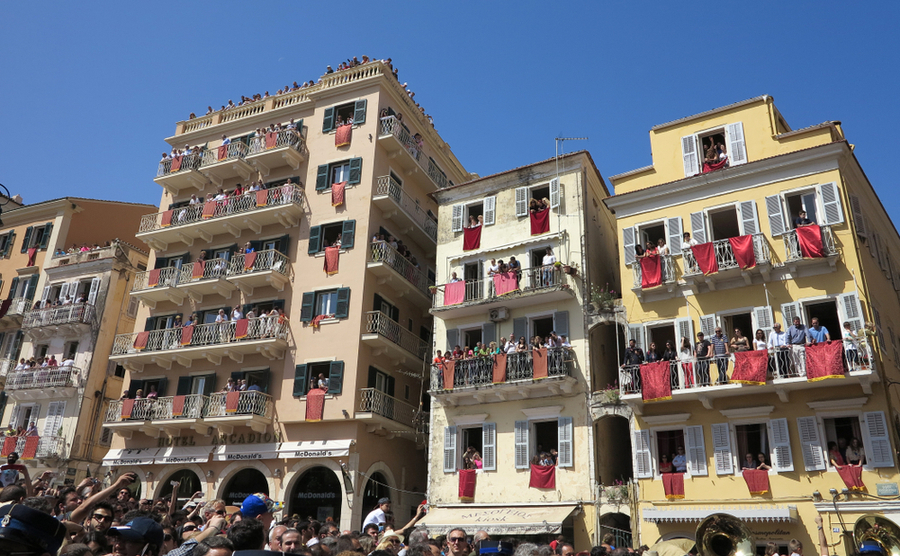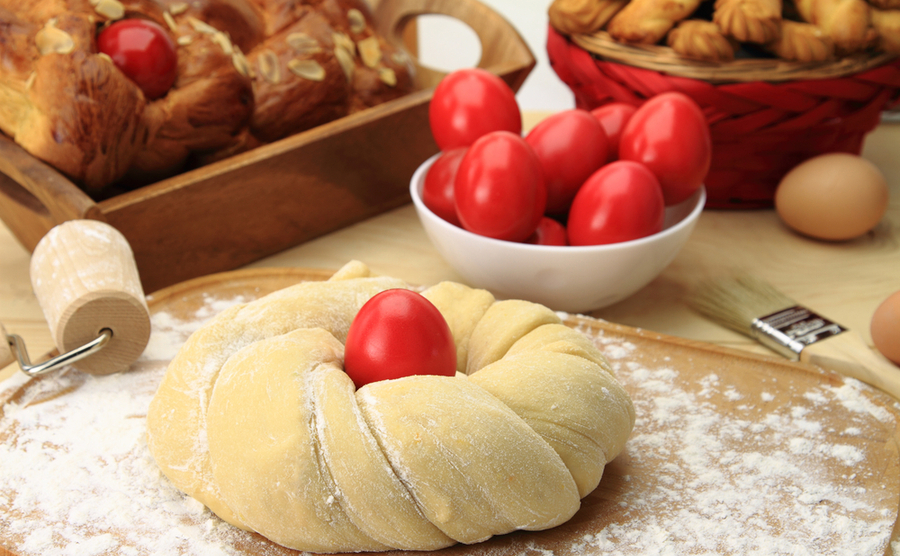If you’re planning a trip to see property in Greece soon, bear in mind that Easter in Greece is a week later than in the UK in 2020. And that’s not where the differences end. See how to enjoy a Greek Easter.
You have to be careful taking an Easter break to Greece. The Greek Orthodox Church doesn’t always celebrate Easter at the same time as the Catholic or the Church of England. In 2020 Easter Sunday is on 19 April, but the celebrations start long before then, and are quite special.
Ready to see some homes in Greece? Don’t book the flights until you’re read our free Viewing Trip Guide. Know exactly what to look out for when seeing properties!
Easter, or Pascha as it is known here, is in fact the most important occasion in the Greek Orthodox Church calendar. That partially explains why church authorities believe it is too important to change the date just to fall in line with the rest of the Christian church.
The Greek church follows the Julian calendar which is 13 days behind the Gregorian calendar that the other churches follow. The other reason is a disagreement that dates from a church conference in 325AD, when the Orthodox church decided that Easter must always follow the Jewish Passover. But that’s enough history, what actually happens?

Easter in Corfu is quite the party! (Jekatarinka / Shutterstock.com)
Holy Week officially starts on Palm Sunday, which is the one before Easter Sunday. It’s an occasion for all your Greek family to come home – like Christmas in the UK or Thanksgiving in the US. (So you can expect massive hikes in air fares too). Being such a geographically scattered country, traditions in local villages can vary widely. Some are more solemn and spiritual, others are more celebratory and lively. On the island of Chios, for example, two rival villages on opposing hills shoot firework rockets at each other. On Skiathos, on the other hand, Easter is a time of quiet contemplation.
For many Greeks, the week leading up to Good Friday will include daily trips to church. Fasting before Easter isn’t easy, so a daily reminder of why you’re suffering can be helpful in taking your mind off food!
Traditionally the men would be slaughtering the lamb, ensuring the retsina is ready, and making fireworks.
Maundy Thursday
Traditionally, Maundy Thursday is when Greek housewives would start baking. So not that different to every other country’s religious traditions then! In today’s Greece the men are much more likely to be involved too, as modern life and economics have changed roles in Greece in many ways. Traditionally, though, the men would be more involved in slaughtering the lamb or goat, ensuring the retsina is ready, and making fireworks. Yes, that’s right, home-made fireworks.
Don’t spend any money on your move to Greece until you’ve read The Currency Guide to Emigration, free to download.
Whoever is doing the cooking, Thursday is for egg loaves. Tsoureki are a sweet plaited brioche-type bread made from a special flour, mahlab, flavoured with ground cherry seeds. Tsoureki is a treat that, like hot cross buns in Britain, has become popular all year. But at Easter the tsoureki has bright red hardboiled eggs pushed into it for a dramatic effect, symbolizing the blood of Christ.

Baking tsoureki for Easter
Good Friday
Many Greeks won’t eat anything at all on Good Friday, the most solemn day. The crucifixion is marked with a procession through the village or town, usually carrying a bier or “epitaph”, decorating with flowers. There are church services in the evening, with the funeral psalms being chanted.
Easter Saturday
This is a day of heavy preparation for the resurrection festivities that will begin at midnight. A special soup called magiritsa is prepared. Not to be confused with either the margarita pizza or the cocktail, magiritsa is made of lamb offal, lettuce and herbs, finished with a special egg sauce. It is eaten at midnight on the Saturday marking, for some, the official end of fasting in Lent. Although distinctly odd to modern western tastes, magiritsa is intended to ease the digestion back into gear after weeks of fasting, ready for Sunday’s feasts.
At midnight drums are beaten, church bells ring and a firework party begins. “Christós Anésti!”
On Saturday evening people gather in church before midnight carrying white candles, then at midnight drums are beaten, church bells ring and a firework party begins. If someone says to you “Christós Anésti!” (Christ is risen) you reply “Alithós Anésti” (he has truly risen). Then it’s home for soup and red boiled eggs.
Easter Sunday
Easter Sunday is a day of celebration, feasting and partying, with a whole lamb or goat barbecued on a spit over an open fire. The first of the year’s retsina wine is poured generously, getting everyone in the mood for some Greek dancing late into the evening, which is just warming up nicely. You can just smell the promise of a new Greek spring and summer on the way.
If you miss Easter in Greece this year, you could set yourself the challenge of living in Greece by Easter 2021? Read more about Greek culture and customs here.












